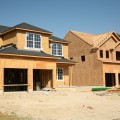 Homebuilders’ confidence in the economy held steady in November, despite the aftermath of a government shutdown and the prospect of more fiscal battles in Washington looming on the horizon.
Homebuilders’ confidence in the economy held steady in November, despite the aftermath of a government shutdown and the prospect of more fiscal battles in Washington looming on the horizon.
The National Association of Homebuilders/Wells Fargo Housing Market Index was at a 54 in November, according to a report released this week. That’s the same number as for October, which was revised downward from a 55 to a 54.
The index has been more than 50 for six straight months, a good sign in what has been a slow economic recovery.
“The fact that builder confidence remains above 50 is an encouraging sign, considering the unresolved debt and federal budget issues causing builders and consumers to remain on the sideline,” said NAHB Chief Economist David Crowe in a press release.
The survey, which has been conducted for 25 years, gauges how homebuilders perceive current single-family home sales as well as the outlook for the next six months. A rating over 50 indicates that more builders view the current housing market as good rather than poor.
The region of the country has an impact on the numbers, according to a press release from the NAHB. The West has the highest Housing Market Index number at 60, while the South remains strong at 56. The Midwest is at a 60 – which is actually three points lower than October’s number. The Northeast is experiencing the toughest time, with a reading of just 39.
Part of the challenges that are slowing down a faster, stronger recovery are the ongoing battles in Washington over the debt ceiling and the overall budget, according to the NAHB.
“Given the current interest rate and pricing environment, consumers continue to show interest in purchasing new homes, but are holding back because Congress keeps pushing critical decisions on budget, tax and government spending issues down the road,” Judson said in the press release.
Judson, in the press release, also said rising construction costs and low appraisals are hurting the construction business and keeping consumers on the sidelines.
Rising mortgage rates have also taken their toll. Betting that the Federal Reserve was planning on easing its economic stimulus plan, many lenders began inching up rates, according to NBC News. However, those rates have started to fall back again as the stimulus plan has continued.
The Pending Home Sales Index from the National Association of Realtors (NAR) has fallen for four straight months, indicating all of these factors are beginning to affect home sales. NAR economist Lawrence Yun, in a press release, said the government shutdown and ongoing fiscal debate is taking its toll.
He anticipates single-digit growth rate in home sales going into 2014.





